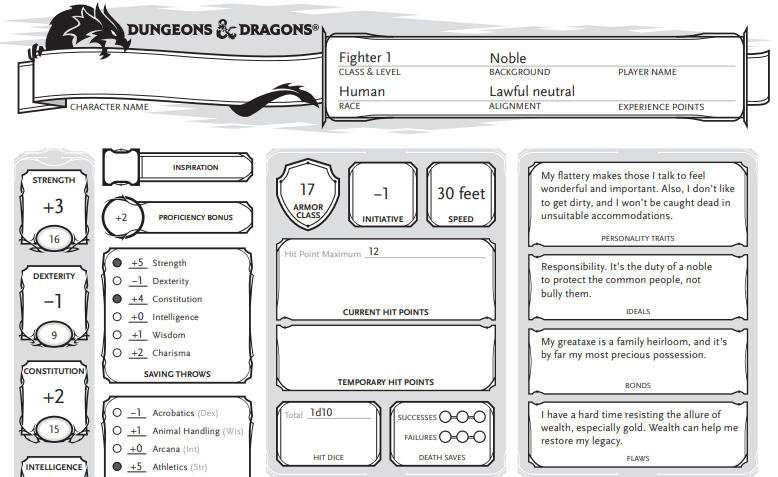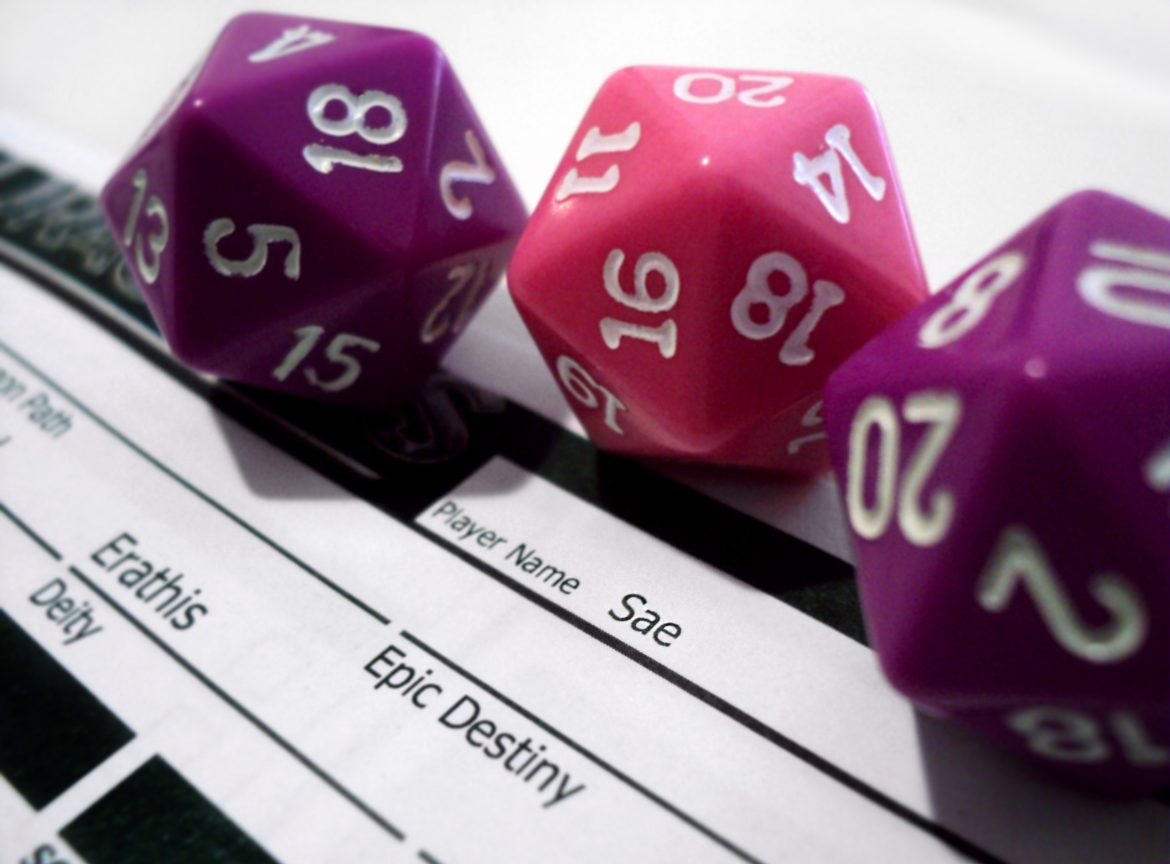Get ready for your first campaign.
Congratulations, you have done the hardest part of Dungeons & Dragons (D&D) already – gotten a group together to play! Now it’s time to make your character. There are so many options available to you, from classes to races to spells to equipment to proficiencies and so on and it can be very overwhelming.
This guide is here to give you the core essentials in quickly building a player character (PC) and getting ready for that first session. There’s loads of information out there that can go over every pro and con to each type of build, but as you will read in this guide, I think that’s boring and you should do this instead.
Decide Who You Want To Play, Not What.
Dungeons & Dragons offer players almost limitless options when initially creating a character. Hours can be spent googling the optimal builds for each class and subclass to give yourself the ultimate advantage in all scenarios. I personally feel this goes against the very fabric of what D&D is about. When you’re making a D&D character, you’re making a living, breathing avatar that you control.
They have thoughts, feelings, history, flaws, bonds and goals in life. Focus on who that person is and build a character around that.
Chances are you won’t create the optimal, “meta” character within whatever class you decide to run, but you will have a character that means something to you while still feeling real.
D&D is not a video game begging to be beaten; rather, it’s a collective story experience to explore and live within.
Use The “Standard Array” For Assigning Your Stats
This is a very specific tip, and a bit numbers heavy, but makes the difference between your character living and dying. When putting points in your 6 core stats, there are three options you can choose to help assign your scores: randomly (roll 4d6, take the highest 3 and choose what ability to put it towards), point buy (you have a pool of 27 points to buy or trade-off numbers towards your stats) and the standard array.
The standard array gives you a predetermined set of numbers (15, 14, 13, 12, 10, 8) to put into your core stats. What makes this system so great for new players is that you can still put your highest score into the stat you will need most but you will also not be absolutely awful at other things.
| What Are The Core Stats? The core stats are the backbone of your character, and represent how good they are at things. Where you put your core stats scores will ultimately affect ability checks (doing things), saving throws (not dying from things) and combat abilities (how good you are at hitting things). The core stats are as follows: Strength – How hard you have hit the gym. Will affect how hard you hit things, how fast you climb things and how many tankards you can crush with your bare hands. Useful For: Barbarians, Fighters* & Paladins. Dexterity – Your agility and gracefulness. Will affect how nimbly you can escape traps, how deftly a lock and be unlocked and how scared your companions will be when you sneak up on them. Useful For: Fighters*, Monks, Rangers & Rogues. Constitution: This is your physical fortitude. Will affect how well you can resist poisons and how much overall health you have. Useful For: Though not the number 1 focus for any class, this is definitely a stat that shouldn’t come last – we all need health! Intelligence: These are your book smarts. Will affect how reasonable you are, how well you can recall information about history or if you left the oven on before adventuring today. Useful For: Artificers & Wizards. Wisdom: These are your street smarts. Will affect how well you can perceive dangerous situations, as well as recalling if those berries are delicious or will make you go blind. Useful For: Clerics & Druids. Charisma: For the silver-tongued among us. Will affect how well you can charm your way into an exclusive party, or out of a night in the stocks. Useful For: Bards, Sorcerers & Warlocks. * With the “Fighter” class, choose your fighting style before assigning your max stat. If you are an archer – dexterity. If you like swords and shields – strength. |
Let’s look at an example of a barbarian.
With the standard array, the chances are you will put your highest score (15) in strength and lowest score (8) into intelligence (Hulk. Smash.) With an 8 intelligence, all intelligence-based abilities will roll with a -1 modifier (when you roll the d20 you -1 from the result). That’s not exactly great but it’s also not awful.
If you built a character using the point buy you could easily take all the points away from intelligence to give your strength a boost. Fine, until an Intellect Devourer makes you roll an intelligence saving throw (which you will fail if you have next to no intelligence) and are then stunned indefinitely.
The standard array lets you build a character that both has a specific skill while also not having a glaring and obvious flaw – in other words, a character that survives past level 5.
Give Them A Backstory
This is tied to my first point, but it is not only worth thinking about who that character is when deciding your class and combat skills, but who they were before this adventure even began. Backstories serve as a touchstone for you as a player to fall back on if you’re unsure how your PC will respond in a situation, as well as giving DMs more narrative meat to play with when building encounters.
When you’re making a D&D character, you’re making a living, breathing avatar that you control.
A backstory doesn’t have to be a 12-page epic. You can break it down to a bullet-point list of personality traits, ideals, bonds and flaws.
Regardless of if you decide to write a long, sweeping story or just a few bullet points, I strongly recommend checking out the pre-generated backstories from the Player’s Handbook & other sourcebooks. Using those will not only give you creative inspiration but can also give your character additional proficiencies and languages learned – something a good DM will certainly lean into at some stage.
Spend Some Time Learning The Format Of The Character Sheet
Your character sheet is the final product of all your hard creative work, and regardless of whether you are using an online tool like D&D Beyond (which I strongly recommend) or pen and paper, you will be now met with a sprawling mess of numbers, equipment, and stats.
It can be a terrifying sight at first, but take your time, analyze the sheet, and learn where things are. The most important things to know are where your ability modifiers and saving throw modifiers are at a glance.

Throughout a session, your DM will frequently ask you to make skill checks for all sorts of scenarios, and, if something goes terribly, a saving throw.
Knowing where these stats are is vital for keeping the flow of the game going. Of course, in your first sessions, the flow will be slower as you get used to the game but having that information nailed will allow you to keep track of other things that your DM will not have the brain space for, such as race & class-specific perks.
Be Honest With Your Rolls And Spell Slots
When all the stats have been assigned, all the tragic backstories are written, and all the spells are chosen, it’s finally time to start playing the game! Everything your character does in a game is decided by the roll of the die. When you attempt to do something amazing and the die isn’t in your favour, it can be tempting to “fudge” (lie about or knock the die to a better number) the roll. I can’t stress enough that you are only cheating yourself if you do this.
Furthermore, don’t get upset at the DM when they put you in peril or annoyed that you can’t do everything you want at level 1 – your DM is there to enforce rules as well as play the game. Support each other and enjoy the game together, and try not to judge the DM for their terrible accent work (that might just be me though…).
Some of my most treasured D&D memories come from players making mistakes because it’s at that point both you and the DM have to be creative in how your character flops to the ground.
The same goes for those spellcasters. You’re limited to a certain number of spells you can cast in an in-game day: don’t lie about it.
When the session is over, I promise you all you and your friends will be talking about how funny it was when the rogue farted whilst trying to sneak or the clutch final fireball from the wizard. Lying about those failures robs you of one of the best experiences D&D can offer you, as well as vital lessons that can be used away from the table.
Michael is a freelance journalist and English Teacher currently living in Western Japan. He has always had a fascination with the way that music, art and mechanics form to create experiences that he usually terrible at. When he is not screaming into rogue-like voids, Michael can be found relaxing with farm-sims or saving the planet from alien invasions. When not gaming, Michael is the dungeon master of a particularly nefarious D&D group, who ruin all of his plans.
